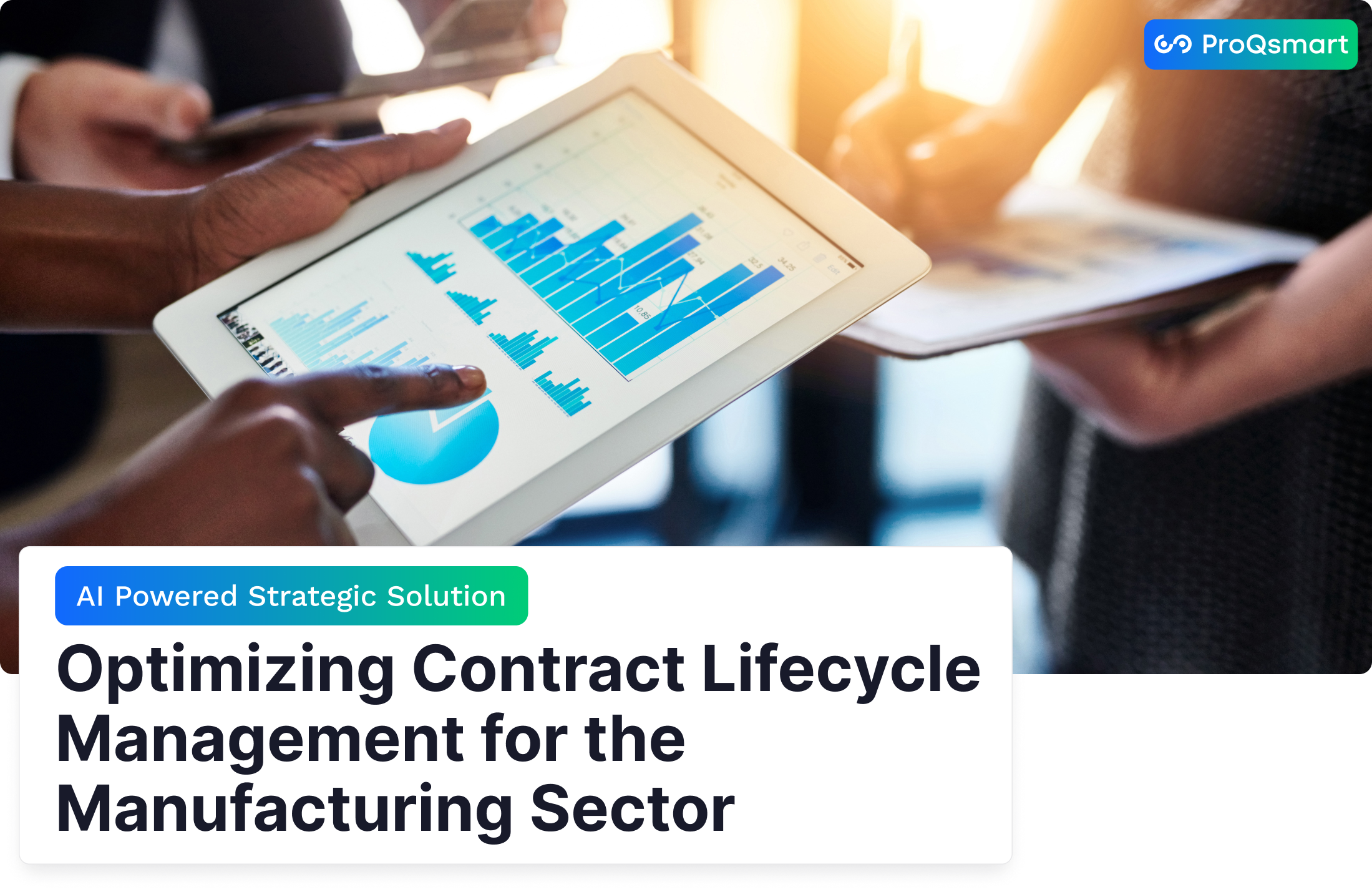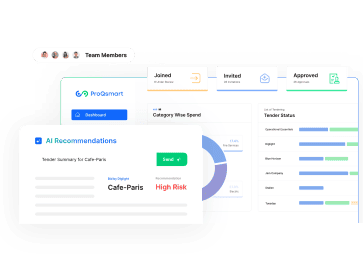Contract lifecycle management is the systematic approach to managing a contract’s creation, execution, and analysis to maximize operational and financial performance. It provides seamless workflows by streamlining each process stage, including drafting, negotiation, renewal, and compliance.
Effective contract management not only minimizes risks and avoids supplier disputes—it creates better relationships with suppliers and increases transparency in procurement activities. Get started using next generation tools and technologies now!
Automate contract management considerations. Automate all aspects of contract lifecycle management from tracking deadlines to monitoring contract performance and compliance.
With a clear emphasis on aligning contracts to support strategic priorities, efficient contract lifecycle management improves accountability and helps guarantee compliance with regulations.
In this blog, we’ll explore actionable strategies, best practices, and tools to optimize your contract processes and drive long-term success in procurement operations.
Understanding Contract Lifecycle Management (CLM)
Contract Lifecycle Management (CLM) encompasses all phases of a contract’s lifecycle. It begins with contract initiation and goes all the way to a contract’s expiration or renewal. At its core, CLM helps organizations reduce processing times, risks and compliance issues while increasing the value derived from their agreements.
It’s not just a repository for your contracts. Instead, it acts as an operational framework, enabling better process efficiencies and overall performance across the full contract lifecycle. By actively tracking performance and compliance at each stage, businesses can avoid missed deadlines, ensure obligations are met, and address potential risks before they escalate.
For example, automated alerts within CLM tools can help keep your teams informed of upcoming renewals, avoiding lapses in crucial contracts.
Smart CLM reduces risk by creating one source of truth for all contract data. It helps ensure transparency and allows for rapid access to important information. If someone were to look up a specific record, paper-based systems usually take hours to find.
By comparison, digital solutions can extract information in seconds. Modern CLM platforms, such as ProQsmart, increase efficiency significantly by automating workflows and improving communication. They further facilitate regulatory compliance and help foster collaboration between public and private stakeholders.
ProQsmart’s AI-driven features, like supplier performance monitoring and subcontractor management, equip businesses with actionable insights to strengthen relationships and optimize procurement strategies.
Stages of the Contract Lifecycle
- Planning: Identifying needs, setting goals, and drafting clear terms.
- Implementation: Negotiating agreements and finalizing execution.
- Pre-contract: Preparing documents and verifying details.
- Handover: Transferring responsibilities to involved parties.
- Contract: Actively managing performance and obligations.
- Pre-renewal: Reviewing terms and assessing renewal opportunities.
- Post-contract: Evaluating outcomes and archiving records.
Key Challenges in Manufacturing CLM
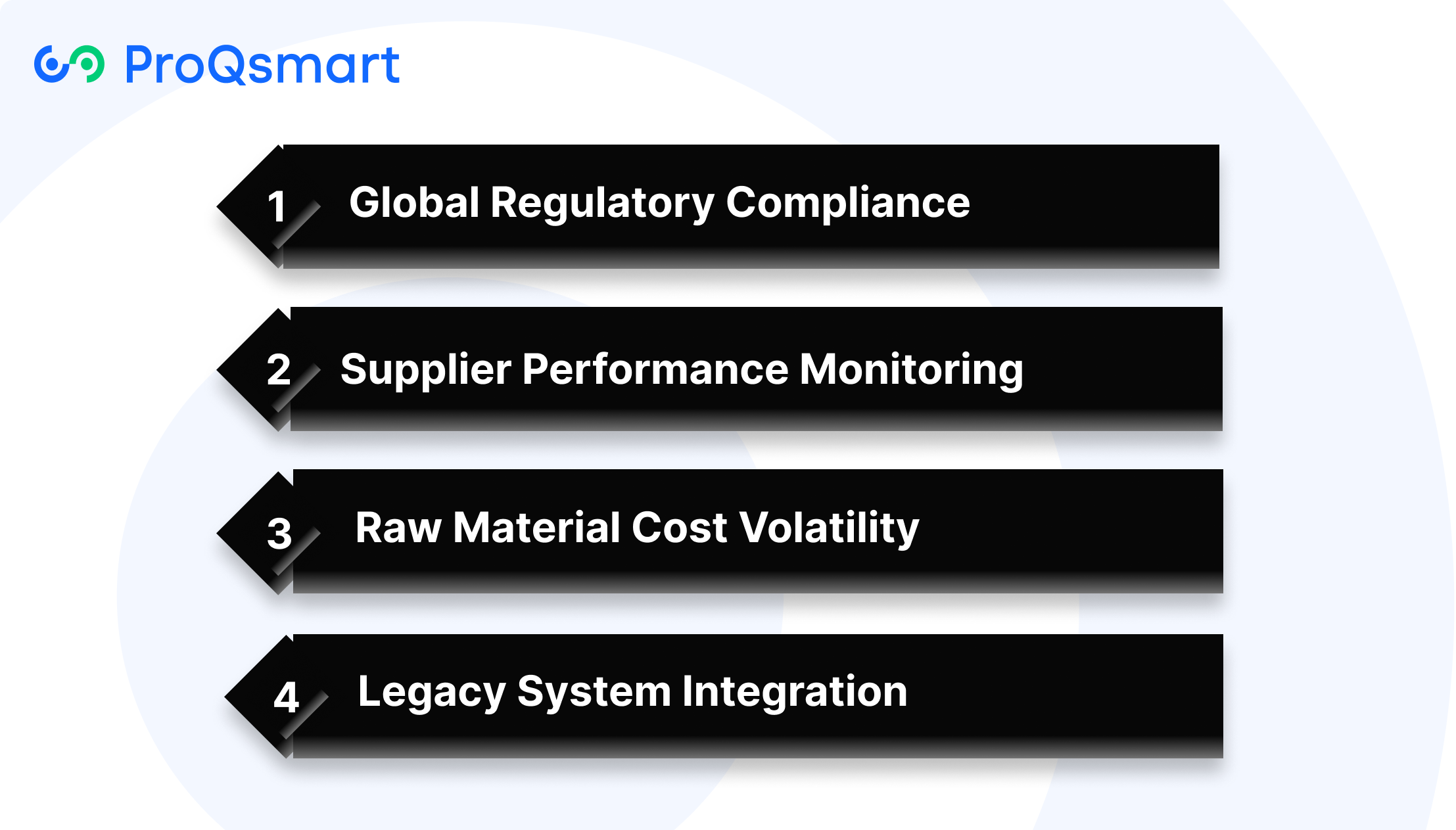
Contract lifecycle management (CLM) in the manufacturing sector comes with a distinct set of challenges. Effectively managing intricate supplier networks, navigating intricate regulatory landscapes, and tackling rising cost volatility requires a high degree of precision.
These challenges greatly affect a company’s operational efficiency, compliance, and profitability, highlighting the importance of having strong strategies built for manufacturing-specific demands.
Global Regulatory Compliance
Manufacturers run into major challenges in following different sets of regulations from jurisdiction to jurisdiction. Contracts need to adhere to environmental policies, labor laws, and safety standards, which differ immensely depending on the region. Potential non-compliance risks can lead to costly legal penalties, interrupted operations, and harm to a company’s reputation.
Centralized CLM platforms, such as ProQsmart, offer highly accurate and reliable compliance tracking. By incorporating regulatory frameworks by design, they minimize risks and guarantee effortless compliance across geographic areas.
Supplier Performance Monitoring
Monitoring suppliers’ compliance with product quality standards and delivery schedules is frequently difficult to manage. Unreliable performance can bring production schedules to a halt, harming the bottom line.
ProQsmart’s supplier performance monitoring tools give manufacturers ongoing snapshots of supplier performance, helping manufacturers catch and correct approaching problems. With automated workflows and real-time tracking, companies can better keep contract terms in check, leading to improved supplier relationships and increased operational stability.
Raw Material Cost Volatility
Volatile raw material pricing changes the landscape for contract negotiations, making the need for adaptable contracts essential. Manufacturers can leverage dynamic contracts that adapt to market shifts, protecting their financial interests.
ProQsmart’s budget-driven procurement connects cost factors with actual-time spend trending, providing actionable insights to strategically negotiate improved terms and conditions, while minimizing risk and volatility.
Legacy System Integration
Because old systems complicate simple things, wipes run the risk of getting installed wrong, or not at all. Seamless integration of modern CLM platforms with ERP, CRM, and other financial platforms not only automates ongoing processes but eliminates costly human error.
ProQsmart’s AI-powered integrations accomplish this, improving efficiency and achieving greater accuracy by eliminating manual processes.
Optimizing CLM for Manufacturing
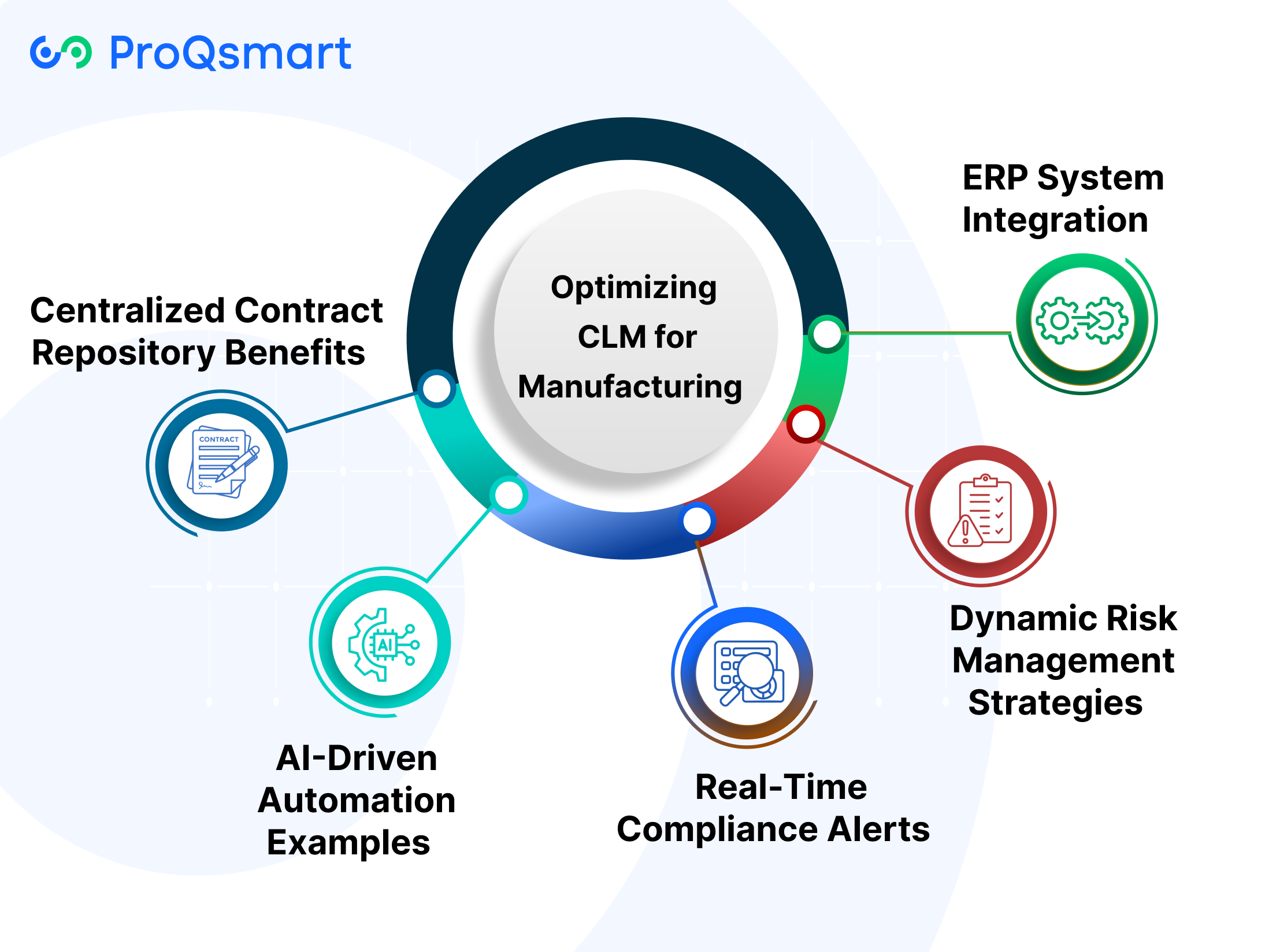
Contract lifecycle management (CLM) in manufacturing is an essential process directly influencing operational efficiency, supplier relationships, and cost management. Optimizing the contract management process involves leveraging advanced contract lifecycle management software, fostering collaboration, and integrating systems tailored to the unique complexities of manufacturing.
Centralized Contract Repository Benefits
A centralized contract repository makes sure all contracts are stored and accessed through a singular platform. This makes it easier to navigate and reduces the chance of redundant work, helping teams find important documents faster.
Storing metadata in a relational database makes aggregation and filtering for reports much simpler. Simultaneously, having the relevant contextual contract history stored empowers far better decision-making.
These repositories increase collaboration across departments. They serve as a single source of truth that brings together the procurement, legal, and production teams.
AI-Driven Automation Examples
AI-powered systems, such as ProQsmart, help automate drafting through the use of pre-approved templates and clauses, minimizing human error and oversight. AI tools further optimize workflows by automating negotiation and approval processes, reducing turnaround times.
For example, ProQsmart’s automated workflows remove the bottlenecks through which data-driven decisions critical to success in today’s marketplaces quickly become mired.
Real-Time Compliance Alerts
Automated compliance alerts help keep your most critical milestones and deadlines on track without the need for tedious manual tracking. Alerts improve oversight of contracts to mitigate risk, allowing manufacturers to be more proactive in anticipating regulatory standards.
This proactive approach minimizes the risk of expensive penalties and allows for more efficient and effective contract execution.
Dynamic Risk Management Strategies
Predictive analytics identify risks in contract performance early, allowing manufacturers to adjust terms proactively within the contract lifecycle management process. Ongoing risk assessment is crucial, enabling dynamic strategies that align contracts with evolving project demands.
ERP System Integration
Aligning contract lifecycle management with ERPs integrates contracts into wider supply management, enhancing the contract management process to synchronize procurement and production while delivering unified visibility through effective contract lifecycle management tools.
ProQsmart’s Role in Manufacturing CLM
It enables them to successfully manage complex supplier relationships, increase compliance and savings, and optimize costs through effective contract lifecycle management. ProQsmart meets the needs of the manufacturing contracting processes with flexible, user-friendly contract management software that improves productivity and visibility across procurement processes.
AI-Powered Supplier Evaluation
ProQsmart leverages machine learning algorithms to conduct comprehensive supplier evaluations. These tools analyze historical performance, compliance records, and delivery reliability, providing a clear risk profile for each supplier.
For example, ProQsmart can flag suppliers with inconsistent delivery timelines or non-compliance with regulatory standards, ensuring you make informed decisions. By using data-driven insights, procurement teams can prioritize reliable suppliers, minimizing disruptions and building stronger partnerships.
Risk profiling further supports this process by identifying potential vulnerabilities, such as financial instability or capacity limitations, ensuring proactive supplier management.
Automated Workflow Streamlining
By automating workflows, ProQsmart removes manual bottlenecks from contract approvals and amendments through the process of contract lifecycle management. This not only helps cut cycle times but facilitates better cross-team collaboration.
For instance, users can access self-service templates, e-signature tools like ProQsmart, and centralized repositories, ensuring faster contract execution while maintaining accuracy. Enterprise-grade features including audit trails and obligation management increase accountability and compliance.
By automating mundane tasks, ProQsmart enables efficiency, freeing teams to drive deeper into procurement objectives aligned with enterprise strategy and growth.
Real-Time Spend Analytics
ProQsmart’s analytics tools give organizations real-time visibilityinto procurement costs so they can easily monitor spending against budget. These tools raise flags on deviations early, allowing for more proactive corrective measures that keep spend on a path toward financial goals.
For instance, spend analytics can pinpoint where raw material procurement is overspending, helping to direct future efforts to cut costs. By leveraging real-time data, this proactive and data-driven approach streamlines processes, improves transparency, minimizes risks, and drives long-term success in contract management.
How to Select a CLM Solution: Features to Look
Selecting the appropriate Contract Lifecycle Management (CLM) solution is key to maximizing operational efficiency. More importantly, it’s key to maintaining compliance and sustaining growth in the long term. A powerful, purpose-built CLM platform should not only meet your organization’s specific needs but provide advanced capabilities to automate and simplify various contract-related tasks.
Here are some key things to consider that should help you in your decision-making process.
Assess Your Needs
Understanding your organization’s specific contract management needs is essential. Start by identifying pain points in your current processes—whether it’s tracking deadlines, managing approvals, or ensuring compliance. Engaging stakeholders, including legal, procurement, and IT teams, provides a well-rounded perspective on operational gaps.
For example, if contract negotiations often stall due to manual processes, a CLM solution with automated workflows and AI-driven risk assessment may be valuable.
Evaluate Key Features
A modern CLM platform should include features like automation for contract authoring, reporting tools for performance tracking, AI-driven high-risk clause identification, and integrated word processing for seamless editing. A clean, intuitive interface further helps to drive easy user adoption and reduce the time spent onboarding new users.
For example, rapid onboarding means your team will start realizing value from the platform right away. ProQsmart combines these capabilities and provides all your data in one central location for improved visibility and control.
Consider Integration Capabilities
Ensure that the contract lifecycle management software integrates seamlessly with existing systems like ERP or CRM. This compatibility boosts data accuracy and workflow efficiency, facilitating real-time collaboration while reducing repetitive tasks in the overall contract management process.
Check for Scalability
A truly scalable solution, particularly in contract lifecycle management processes, is one that grows with the business, providing long-term value. Flexible configurations accommodate organizational changes, ensuring the contract management software remains relevant.
Review Security Measures
Advanced security features, including encryption and access controls, enhance contract management software by safeguarding sensitive data.
Measuring CLM ROI
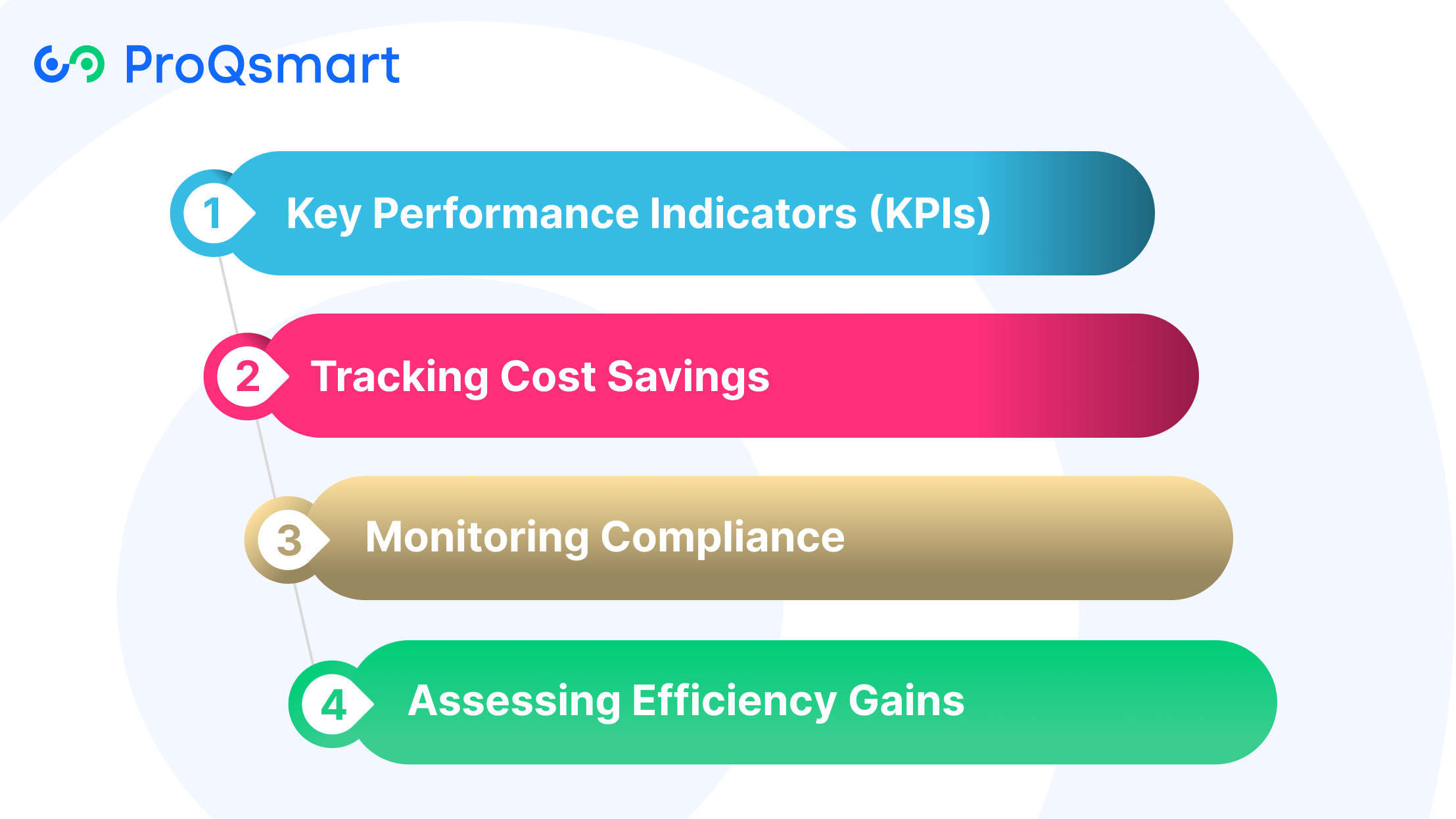
To do so, you need a comprehensive strategy to measure CLM ROI. Lead with the monetary returns it has begun to realize—and the streamlining of internal operations it has achieved since getting started. A credible and rigorous measurement process reveals and quantifies the positive impact of CLM.
It further helps marry contract management strategies to the overall business objectives. With CLM, organizations can use these tips to build a powerful business case for their CLM transformation. They can do this by determining metrics like total cost of ownership (TCO) and realized benefits.
Key Performance Indicators (KPIs)
Key performance indicators (KPIs) are essential in showing what CLM effectiveness is. Metrics like compliance rates, contract turnaround times, and contract value give you hard, tangible insight into function.
Regularly reviewing KPIs ensures continuous improvement, helping organizations adapt strategies and address inefficiencies proactively. For example, tracking contract cycle time highlights process bottlenecks, while monitoring compliance rates ensures adherence to regulatory and contractual obligations.
Tracking Cost Savings
Quantifying cost savings is one of the more obvious yet critical categories of showing CLM ROI. A deep dive into procurement expenses, contract efficiencies, and vendor performance only further emphasizes the value they add.
ProQsmart, for example, streamlines workflows and enhances supplier relationships, enabling organizations to realize hundreds of thousands to millions in cost savings. Research shows that 71% of organizations experienced lower administrative expenses when they migrated to CLM.
Most of these firms realized an ROI of 10%-20% within their first year.
Monitoring Compliance
By minimizing legal risk, compliance monitoring protects from reputational harm while ensuring the organization maintains its integrity. Tools such as ProQsmart help automate adherence tracking, so contracts always meet the latest regulatory standards.
By being proactive in identifying non-compliance, businesses can save themselves from unnecessary penalties and reputational harm.
Assessing Efficiency Gains
Efficiency gains like smoother workflows and needed contract execution certainty are signs of effective contract lifecycle management. Ongoing analysis of these metrics should guide optimization efforts in the contract management process, ensuring continued improvement and alignment with strategic goals.
Conclusion
Managing contracts effectively in the fast-paced manufacturing sector is essential to maintaining operational efficiency and competitiveness. A well-implemented contract lifecycle management (CLM) solution connects every stage of the process seamlessly, from drafting to renewals. By automating workflows and providing real-time access to critical data, CLM systems eliminate common challenges such as missed milestones and duplicated information. This not only reduces administrative burdens but also enhances compliance and enables informed decision-making.
Advanced CLM systems deliver measurable outcomes, including reduced cycle times, improved supplier performance, and streamlined operations. By adopting a solution tailored to address specific challenges, organizations can optimize contract management processes and position themselves for success in a dynamic market.
Explore ProQsmart’s contract lifecycle management solutions—book a demo today to discover innovative tools designed to transform procurement workflows and drive better results.

